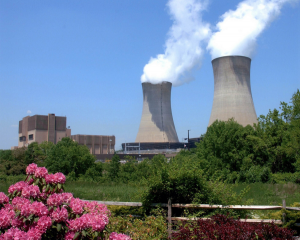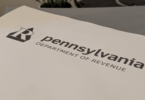By Dave Lemery | Watchdog.org

A view of the Limerick Generating Station in Montgomery County.
Credit: Nuclear Regulatory Commission
The long-rumored nuclear bailout in Pennsylvania finally has a hard number attached to it: $500 million a year.
That’s the amount of money that consumers would be sending to the three companies that operate five nuclear power plants in the state if House Bill 11 is passed by the Legislature and signed by the governor.
HB11 was unveiled Monday in a news conference by Rep. Tom Mehaffie, R-Hershey, whose district is adjacent to the Three Mile Island nuclear facility and is home to many of TMI’s workers.
Mehaffie, a two-term member of the House of Representatives, pitched his plan as the best way to rein in future electricity costs for consumers. He argued that without his legislation, the power plants would close and Pennsylvanians would pay even more than the bailout.
“The cost of doing nothing is $4.6 billion [a year],” Mehaffie said. “$788 million annually in higher electric electricity costs to the consumers, whereas the cost of this bill is about $500 million. That is an eight-to-one benefit-to-cost ratio. I see this situation as a win-win.”
The bill would allow nuclear companies to take part in the Alternative Energy Portfolio Standards, existing legislation that prioritizes carbon-free energy sources such as wind and solar power.
Mehaffie argued that one way or another, electric costs are going up for consumers, but with his proposal the increase can be lessened.
“Without nuclear energy, the typical residential electric rate would increase $2.39 per month,” he said. “But with nuclear energy, the typical monthly residential electric bill will only increase $1.77 per month.”
In a phone interview following Mehaffie’s news conference, Steve Kratz, spokesperson for Citizens Against Nuclear Bailouts – a coalition of business and advocacy groups – said that Mehaffie’s argument presumes that all of the nuclear plants in Pennsylvania will close immediately without assistance from the state.
“Four of the five plants are making way too much money to justify closing,” Kratz said.
“The nuclear industry collectively is projected to make over $640 million in profits in 2018. That’s not an industry that’s shutting down anytime soon completely.”
CANB noted in a news release that Exelon, owner of three of the five nuclear plants in the state, recently issued a news release touting the health of the company’s electricity generation operations. The Limerick plant produced a $193 million profit, Peach Bottom saw a $150 million profit, and the antiquated Three Mile Island, which is slated to be closed this year, lost $37 million.
“Exelon is using Three Mile Island as their sacrificial lamb to try and increase their profits on what they already called a record year in 2018,” Kratz said. “It’s a manufactured issue.”
During Mehaffie’s news conference, Trish McFarland of the Delaware County Chamber of Commerce said the business community would be in favor of the state helping out the nuclear industry.
“Pennsylvania’s business community knows that our state’s nuclear energy industry is a vital asset that provides millions of households and businesses with safe, reliable and affordable carbon-free electricity,” she said. “Schools, shops, hotels, restaurants, banks, community centers and homes all benefit from the dependability that nuclear energy provides for daily living.”
Kratz argued that McFarland’s assertion was wrong on two fronts – for one, a number of business-oriented organizations support his organization, such as the National Federation of Independent Businesses and the Pennsylvania Manufacturers’ Association. For another, PJM Interconnection, the utility company that maintains the electrical grid for a large swath of the eastern U.S., has testified that it has no worries about its ability to deliver power in its service area even if some nuclear plants were to close down.
“When electricity costs go up, every cost is up,” Kratz said. “The commonwealth of Pennsylvania’s electricity costs are going to go up. So what’s the impact going to be? School districts’ electricity costs are going to go up, so what’s the impact on taxpayers?
“So consumers are not only going to have to pay it directly out of their pocket, through their increased electricity bills, but certainly everywhere else in their lives that that uses electricity, which is everything.”
Mehaffie, on the other hand, sees his legislation as a jobs retention bill, which he argued is much better than a job creation bill.
“[There are] 16,000 jobs across the state supported by the nuclear power industry,” he said. “If a new company and a new industry wanted to set up shop … and bring 16,000 new jobs to Pennsylvania, the Legislature would be tripping over each other to do whatever is necessary to bring these jobs to PA.”








